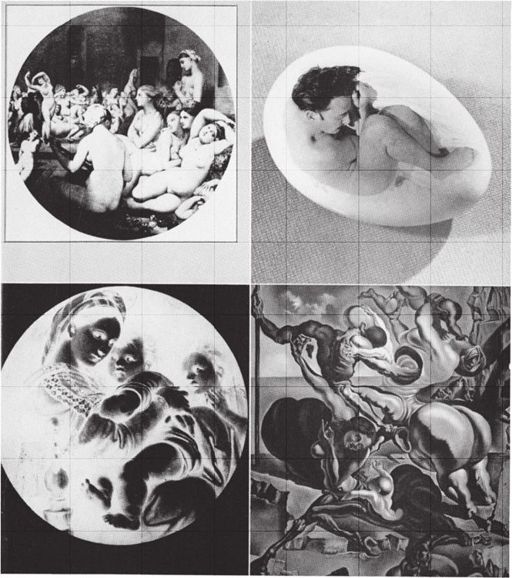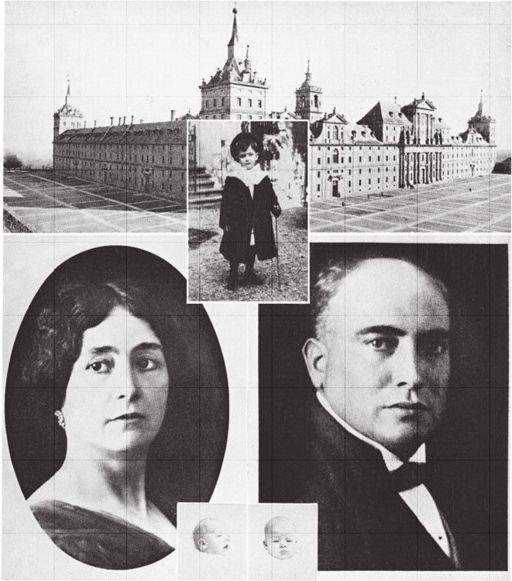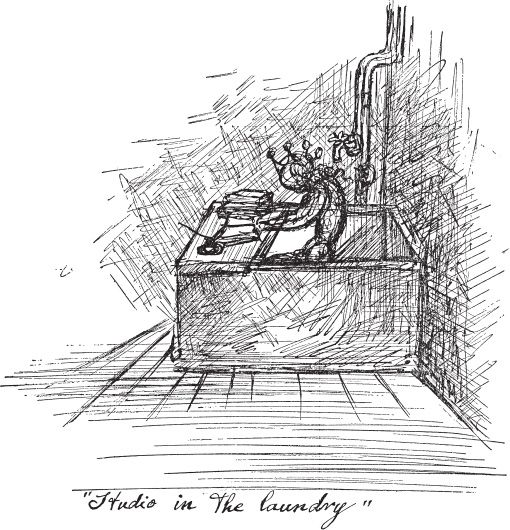The Secret Life of Salvador Dali (14 page)
Read The Secret Life of Salvador Dali Online
Authors: Salvador Dali

I accordingly installed myself there in the following fashion: I placed my chair inside the cement tray, and the vertical wooden board (serving to protect the washerwoman’s dress from the water) I put horizontally across the top so that it half covered the tray. This was my work table! Occasionally on very hot days I would take off my clothes. I then had only to open the faucet and the water filling the tray would rise along my body high up my waist. This water, coming from a reservoir on which the sun would beat down all day long, was tepid. It was somewhat like Marat’s bathtub. The whole empty space between the laundry tray and the wall was given over to the arrangement of the most varied objects and the walls were covered with pictures that I painted on the covers of hat boxes of very pliable wood which I stole from my aunt Catalina’s millinery shop. The two oil paintings which I did sitting in the tray were the following: one represented the scene of “Joseph meeting his Brethren,” and was entirely imaginary; the second was to a certain extent plagiarized from an illustration in a little book in colors which was a summary of the
Iliad
and showed Helen
6
of Troy in profile looking at the horizon. The title was “And the slumbering heart of Helen was filled with memories...” In this picture (about which I dreamed a great deal), almost on the edge of the horizon I painted an infinitely high tower with a tiny figure on its summit It was surely myself! Aside from the paintings there were also objects which already were embryos of those surrealist objects invented later on in 1929 in Paris. I also made at this period a copy of the
Venus of Milo
in clay; I derived from this my first attempt at sculpture an unmistakable and delightful erotic pleasure.

Robinet.

I. Intra-Uterine Memories
Ingres’ “The Turkish Bath” is a preeminent unconscious expression of the intra-uterine paradise.
Dali photographed in a sleeping pose, within the form of an egg, by F. Halsman.
The Child Jesus is situated like an unhatched chick, within the divine egg shape formed by the Raphaelesque curves.
Dali’s 1942 “Family of Marsupial Centaurs”; the children can come out of, and go back into, the maternal uterine paradise.
Most pictures of rounded form are dominated by intrauterine and paradisiac elements of the consciousness
.

II. Child Heredity
The Monastery of El Escorial, the inquisitorial beauty of whose architecture exercised a powerful influence on Dali’s child mind.
Dali as a child photographed by Mr. Pitchot.
Felipa Domenech, mother of Salvador Dali.
Salvador Dali Cusi, father of Salvador Dali.
Salvador Dali Domenech as an infant.

I had brought up to my laundry the whole collection of “Art Govens”; these little monographs which my father had so prematurely given me as a present produced an effect on me that was one of the most decisive in my life. I came to know by heart all those pictures of the history of art, which have been familiar to me since my earliest childhood, for I would spend entire days contemplating them. The nudes attracted me above all else, and Ingres’
Golden Age
appeared to me the most beautiful picture in the world and I fell in love with the naked girl symbolizing the fountain.
It would be interminable for me to narrate all that I lived through inside my laundry tray, but one thing is certain, namely that the first pinches of salt and the first grains of pepper of my humor were born there. I began already to test and to observe myself while accompanying my voluptuous eye-winks with a faint malicious smile, and I was vaguely, confusedly aware that I was in the process of playing at being a genius. O, Salvador Dali! You know it now! If you play at genius you become one!
My parents did not tire of answering the invariable question which their friends would ask in the course of a visit, “And Salvador?” “Salvador has gone up on the roof. He says he has set up his painter’s studio in the laundry! He spends hours and hours up there by himself!” “Up there!” That is the wonderful phrase! My whole life has been determined by those two antagonistic ideas, the top and the bottom. Since my earliest childhood I have desperately striven to be at the “top.” I have reached it, and now that I am there I shall remain there till I die.
I have always felt the greatest moral uneasiness before the anonymity of names in cemeteries, engraved as far as the eye can see in a symmetrical vista to be found only in cemeteries.
What a palpitating magic it was to be able to escape the parental dining-room and run madly up the stairs leading to the roof of the house and, having arrived, to lock the door behind me and feel invulnerable and protected in the total refuge of my solitude. Once I had reached the roof I felt myself become unique again; the panoramic view of the town of Figueras, outstretched at my feet, served in the most propitious way to stimulate the limitless pride and ambition of my ruling imagination. My parents’ house was one of the highest in the town. The whole panorama as far as to the Bay of Rosas seemed to obey me and to depend upon my glance. I could also see coming out of the College of the French Sisters those same little girls who gave me feelings of shame when I passed them on the street, and who now did not intimidate me, even if they were there before me, looking straight at me.
There were times when I would bitterly long to run out into the streets and participate in the confused aphrodisiac mingling of night games. I could hear the joyous cries of all the other children, of those anonymous ones, fools, ugly and handsome, of the boys and especially the girls, rising toward me from below and fastening like a martyr’s arrow in the center of the hot flesh of my chest composed of massive pride! But no! no! and again NO! Not for anything in the world! I, Salvador, knew that I must remain there, sitting in the damp interior of my laundry tray, I, the most solitary child, surrounded only by the wavering and embittered chimera of my forbidding personality. Besides, I was already so old! And to prove it to myself I would forcibly pull down that king’s crown with its fringe of white hair upon my head, seaming my brow with blood-red dents, for I would not admit that my head was growing!
When twilight had fallen I would come out of my laundry, and this was my favorite moment! The smooth and soundless flight of the swallows was already interwoven with that other antagonistic flight, awkward and vacillating—the flight of the bats; I would further wait for the voluptuous moment when I would remove my crown which was becoming so tight that a violent pain on my temples would be added to the real headache produced by that pitiless continual pressure. I would walk up and down the length of the terrace saying to myself, “Just a little longer!” trying to prolong the course of my meditations by some sublime thought. In such moments, exasperated by pain, I would deliver speeches aloud with such grandiloquent verve and intonation that I became imbued with a fantastic and passionate tenderness toward myself.
7
My speeches would succeed one another in a purely automatic fashion and often my words would in no way correspond to the stream of my thoughts. The latter would seem to me to attain the summit of the sublime and I had the impression of discovering each second, in a more and more inspired and unerring fashion, the enigma, the origin and the destiny of each thing. The city lights would progressively turn on, and for each new star a tiny flute would be born. The monotone and rhythmic song of the crickets and the frogs would stir me sentimentally by superposing upon the present twilight anguish evocative memories of former springtimes. The sudden apparition of the moon only served to exacerbate my ecstasy to a paroxysm and the megalomaniac tumult would reach such a height of delirious egocentricity that I felt myself rising to the very summit of the most inaccessible stars, the whirl of my narcissism having attained the proportions of a cosmic revery; at this moment a calm, ungrimacing, intelligent flow of tears would come and appease my soul. For some time I had felt within my caressing hand something small, moist, bizarre. I looked in surprise: it was my penis.

Grillon.
I finally removed my crown and pleasurably rubbed the quickly soothed pain of the bruise which the crown had made with its long embrace. I went down to the dining room dead with fatigue, I was not hungry and I looked so ill that my parents were terrified. My mother looked at me questioningly. “Why aren’t you hungry? What does my darling want? I can’t bear to look at the little darling! He isn’t yellow, he’s green!”
Green or not, I would go up again on all occasions to the top of the roof, and one day I even went up on the roof of the little laundry where I felt for the first time in my life the sensation of dizziness when I realized that nothing stood between me and the empty space below. I had to remain for several minutes flat on my belly with my eyes shut to resist
the almost invincible attraction that I felt sucking me toward the void.
